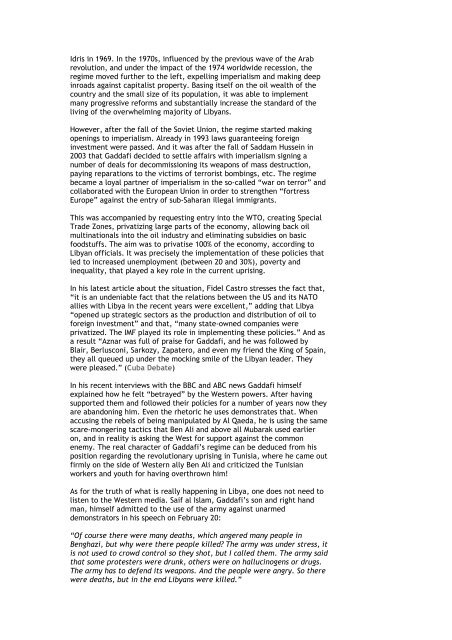April 2011 - Centre for Civil Society - University of KwaZulu-Natal
April 2011 - Centre for Civil Society - University of KwaZulu-Natal
April 2011 - Centre for Civil Society - University of KwaZulu-Natal
You also want an ePaper? Increase the reach of your titles
YUMPU automatically turns print PDFs into web optimized ePapers that Google loves.
Idris in 1969. In the 1970s, influenced by the previous wave <strong>of</strong> the Arab<br />
revolution, and under the impact <strong>of</strong> the 1974 worldwide recession, the<br />
regime moved further to the left, expelling imperialism and making deep<br />
inroads against capitalist property. Basing itself on the oil wealth <strong>of</strong> the<br />
country and the small size <strong>of</strong> its population, it was able to implement<br />
many progressive re<strong>for</strong>ms and substantially increase the standard <strong>of</strong> the<br />
living <strong>of</strong> the overwhelming majority <strong>of</strong> Libyans.<br />
However, after the fall <strong>of</strong> the Soviet Union, the regime started making<br />
openings to imperialism. Already in 1993 laws guaranteeing <strong>for</strong>eign<br />
investment were passed. And it was after the fall <strong>of</strong> Saddam Hussein in<br />
2003 that Gaddafi decided to settle affairs with imperialism signing a<br />
number <strong>of</strong> deals <strong>for</strong> decommissioning its weapons <strong>of</strong> mass destruction,<br />
paying reparations to the victims <strong>of</strong> terrorist bombings, etc. The regime<br />
became a loyal partner <strong>of</strong> imperialism in the so-called “war on terror” and<br />
collaborated with the European Union in order to strengthen “<strong>for</strong>tress<br />
Europe” against the entry <strong>of</strong> sub-Saharan illegal immigrants.<br />
This was accompanied by requesting entry into the WTO, creating Special<br />
Trade Zones, privatizing large parts <strong>of</strong> the economy, allowing back oil<br />
multinationals into the oil industry and eliminating subsidies on basic<br />
foodstuffs. The aim was to privatise 100% <strong>of</strong> the economy, according to<br />
Libyan <strong>of</strong>ficials. It was precisely the implementation <strong>of</strong> these policies that<br />
led to increased unemployment (between 20 and 30%), poverty and<br />
inequality, that played a key role in the current uprising.<br />
In his latest article about the situation, Fidel Castro stresses the fact that,<br />
“it is an undeniable fact that the relations between the US and its NATO<br />
allies with Libya in the recent years were excellent,” adding that Libya<br />
“opened up strategic sectors as the production and distribution <strong>of</strong> oil to<br />
<strong>for</strong>eign investment” and that, “many state-owned companies were<br />
privatized. The IMF played its role in implementing these policies.” And as<br />
a result “Aznar was full <strong>of</strong> praise <strong>for</strong> Gaddafi, and he was followed by<br />
Blair, Berlusconi, Sarkozy, Zapatero, and even my friend the King <strong>of</strong> Spain,<br />
they all queued up under the mocking smile <strong>of</strong> the Libyan leader. They<br />
were pleased.” (Cuba Debate)<br />
In his recent interviews with the BBC and ABC news Gaddafi himself<br />
explained how he felt “betrayed” by the Western powers. After having<br />
supported them and followed their policies <strong>for</strong> a number <strong>of</strong> years now they<br />
are abandoning him. Even the rhetoric he uses demonstrates that. When<br />
accusing the rebels <strong>of</strong> being manipulated by Al Qaeda, he is using the same<br />
scare-mongering tactics that Ben Ali and above all Mubarak used earlier<br />
on, and in reality is asking the West <strong>for</strong> support against the common<br />
enemy. The real character <strong>of</strong> Gaddafi’s regime can be deduced from his<br />
position regarding the revolutionary uprising in Tunisia, where he came out<br />
firmly on the side <strong>of</strong> Western ally Ben Ali and criticized the Tunisian<br />
workers and youth <strong>for</strong> having overthrown him!<br />
As <strong>for</strong> the truth <strong>of</strong> what is really happening in Libya, one does not need to<br />
listen to the Western media. Saif al Islam, Gaddafi’s son and right hand<br />
man, himself admitted to the use <strong>of</strong> the army against unarmed<br />
demonstrators in his speech on February 20:<br />
“Of course there were many deaths, which angered many people in<br />
Benghazi, but why were there people killed? The army was under stress, it<br />
is not used to crowd control so they shot, but I called them. The army said<br />
that some protesters were drunk, others were on hallucinogens or drugs.<br />
The army has to defend its weapons. And the people were angry. So there<br />
were deaths, but in the end Libyans were killed.”
















